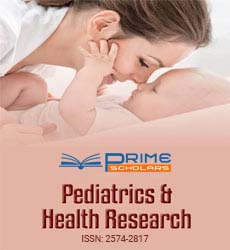Commentary Article - (2023) Volume 8, Issue 3
Common Child Health Problems: Understanding, Preventing, and Treating
Dashnal Kunal*
Department of Science, University of California, USA
*Correspondence:
Dashnal Kunal,
Department of Science, University of California,
USA,
Email:
Received: 30-Aug-2023, Manuscript No. IPPHR-23-17996;
Editor assigned: 01-Sep-2023, Pre QC No. IPPHR-23-17996 (PQ);
Reviewed: 15-Sep-2023, QC No. IPPHR-23-17996;
Revised: 20-Sep-2023, Manuscript No. IPPHR-23-17996 (R);
Published:
27-Sep-2023, DOI: 10.36648/2574-2817-8.3.26
Description
Food allergies or environmental allergies can affect infants,
leading to symptoms like hives, eczema, or digestive issues.
Identifying the allergen and consulting with an allergist is essential
for appropriate management. Parenting comes with
its share of challenges, including addressing common infant
health problems. While these issues can be worrying, it’s important
to remember that most of them are manageable and
temporary. Maintaining open communication with healthcare
providers and seeking their guidance when needed can provide
parents with the tools and knowledge to ensure their infant’s
health and well-being. Remember, early intervention and preventive
measures can go a long way in promoting your baby’s
good health and happiness. Children are the future, and ensuring
their health and well-being is a priority for parents and society
as a whole. Despite advances in healthcare, children are
susceptible to various health problems. This article explores
some of the most common child health problems, their causes,
symptoms, and preventative measures, as well as how they
can be effectively managed. Respiratory infections, including
the common cold, flu, and pneumonia, are frequent health
issues among children. These infections can cause symptoms
like coughing, sneezing, congestion, and fever. Ensuring that
your child receives annual flu vaccinations and teaching good
hygiene practices like regular hand washing can help prevent
the spread of respiratory infections. Ear infections are common
in children, especially during their early years. Symptoms may
include ear pain, fever, and fussiness. If your child experiences
recurrent ear infections, consult a pediatrician who may recommend
interventions like antibiotics or ear tube placement
to prevent further occurrences. Allergies can manifest in children
as hay fever, food allergies, eczema, or allergic asthma.
Identifying the allergen is essential, as it helps in implementing
avoidance strategies and, if necessary, allergy-specific treatments
like antihistamines or allergy shots. Childhood asthma
is a chronic condition that can cause wheezing, coughing, and
difficulty breathing. Management involves long-term control
medications and, in some cases, quick-relief inhalers to control
symptoms. Identifying triggers and reducing exposure to
allergens can also help manage asthma effectively. Childhood
obesity is a growing concern worldwide. It can lead to various
health issues, including diabetes, high blood pressure, and
heart disease. Encouraging a balanced diet, regular physical
activity, and limiting screen time are crucial steps to prevent
and manage childhood obesity. Skin problems such as eczema
and dermatitis are common in children. Proper skincare, using
hypoallergenic products, and addressing triggers like food allergies
or irritants are essential for preventing and managing
skin issues. Mental health problems, including anxiety and depression,
can affect children of all ages. Open communication,
seeking professional help, and promoting a supportive environment
can significantly impact a child’s emotional well-being.
Accidental injuries, including falls, burns, and car accidents,
are a leading cause of child health problems. Parents should
be vigilant in creating a safe environment, using car seats and
seatbelts, and educating children about safety measures. Child
health problems are an inherent part of growing up, but with
the right knowledge and preventive measures, many of these
issues can be effectively managed or even prevented. Regular
healthcare visits, open communication, and a supportive family
environment play crucial roles in maintaining children’s health
and well-being. Every child is unique, so it’s important to tailor
health management strategies to their individual needs, with
the guidance of healthcare professionals, to ensure they grow
into healthy, happy adults.
Acknowledgement
None.
Conflict Of Interest
None.
Citation: Kunal D (2023) Common Child Health Problems: Understanding, Preventing, and Treating. Pediatr Heal Res. 8:26.
Copyright: © 2023 Kunal D. This is an open-access article distributed under the terms of the Creative Commons Attribution
License, which permits unrestricted use, distribution, and reproduction in any medium, provided the original author and source
are credited.
